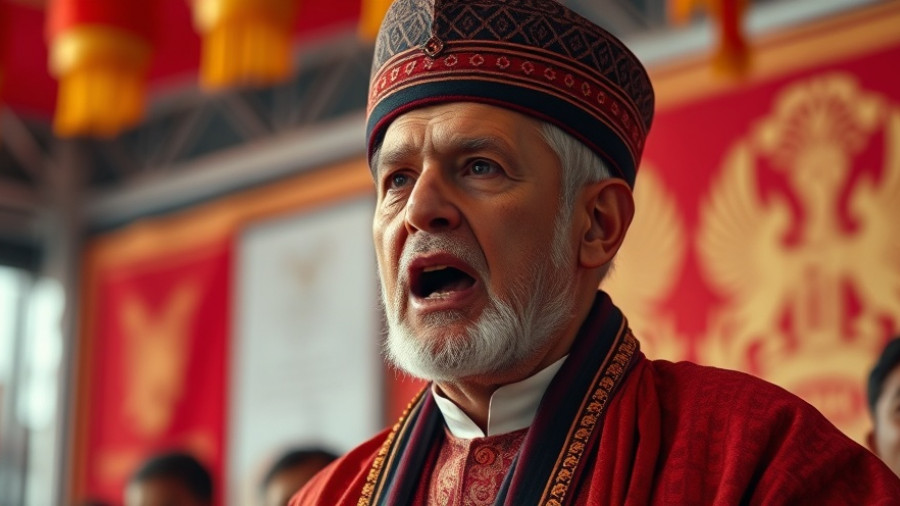
The Call for Civil Disobedience: Understanding the Ghost Town Protests
On November 3rd, 4th, and 5th, Cameroonian opposition leader Issa Cheroma Bakari has called for a nationwide shutdown to protest the alleged electoral fraud that marred the recent presidential elections. In an age when the political environment in Africa is under scrutiny, his assertion of a 'ghost town' protest resonates with a wider discourse about government accountability and citizen engagement.
In 'Cameroon opposition leader Tchiroma calls for 3 days of 'ghost town' protests', the discussion dives into political activism in Cameroon, exploring key insights that sparked deeper analysis on our end.
A Demand for Transparency in Elections
Cheroma’s claim that he was robbed of victory in the October 12th elections reflects a common concern across many African nations where elections have resulted in civil unrest. After incumbent President Paul Biya, who has ruled since 1982, was declared the winner, Cheroma’s supporters believe the election results were fabricated, leading to the escalation of protest activity. In historical context, elections in Africa often come with accusations of vote rigging, manipulation, and the suppression of dissenting voices. This parallel highlights the urgency of Cheroma’s message and the need for immediate action from both citizens and political leaders.
Social Resonance: Why This Action Matters
The ghost town initiative is not merely a political statement; it’s a social mobilization aimed at engaging the public to demand change. For many Cameroonians, the call to cease all activities for three days is a profound act of solidarity against what they perceive as a corrupt governing system. The emotional weight of Cheroma’s message, urging citizens to remain calm but resolute, leads to collective empowerment and frustration that can fuel future actions. The protests signify a united stand against a legacy of systemic corruption that has affected governance in Africa, echoing sentiments shared by grassroots movements throughout the continent.
These protests are a microcosm of larger trends unfolding across Africa. Countries like Nigeria and Sudan have also seen popular uprisings against longstanding government corruption and electoral manipulation. The shared narratives of disenfranchisement foster a sense of kinship among citizens in different nations—ultimately encouraging them to share tactics and solidarity across borders. The resilience shown by various movements serves as a blueprint for advocacy and demonstrates that the quest for democracy and rights is universal.
The international community's reaction to events like these is crucial. As media attention swells, not just local but global voices join the fray, applying pressure on authoritarian leaders and consolidating the urgency for responsive governance. Cheroma’s protests illuminate the that political accountability is not solely a domestic issue, but a global concern tied to human rights and democratic principles.
Future Predictions and Opportunities for Change
Looking ahead, the ghost town protests could pave the way for either a drastic shift in Cameroon’s political landscape or an exacerbation of state repression. The commitment to collective civil action could galvanize citizens towards further political engagement, leading to potential shifts in policy or even regime change. As activism takes forms beyond physical barriers—with digital advocacy also on the rise—the emergence of technology-enabled campaigns will facilitate enhanced participation and awareness.
Decisions Citizens Can Make Moving Forward
For supporters and those sympathetic to Cheroma’s cause, the protest presents numerous avenues for involvement. They can leverage social media to create awareness, join organized marches, or participate in discussions that address the significance of their participation in democracy. Understanding their power within the political system will empower citizens—and may encourage voter registration drives or demand reforms in electoral processes.
Conclusion: The Role of Individual Action in Governance
The implications of Cheroma’s ghost town protests extend beyond mere disruption; they symbolize a burgeoning resistance against authoritarianism that is prevalent in several African countries. As citizens assert their rights and demand a more accountable government, the unity forged in the spirit of these protests has the potential to ignite a larger movement towards democratic accountability across Africa.
In light of these developments, we encourage individuals to deepen their engagement with local and national governance discussions. It is imperative to stay informed and actively participate in the political process, as even the smallest actions can contribute to broader social change.
 Add Row
Add Row  Add
Add 




Write A Comment